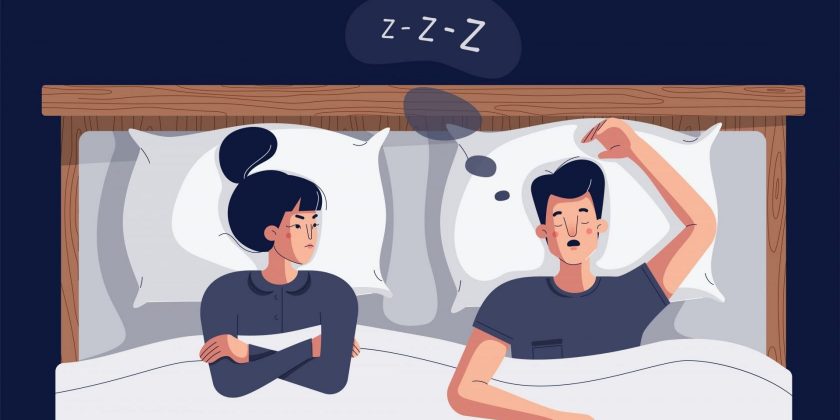This January, we’re on the search for quick, accessible hacks to kickstart 2023 in the strongest way possible. Today’s sleep kickstarter: expert tips for couples struggling to sleep deeply together.
You’ve got your sleep routine down. There’s nothing you don’t know about optimising your shuteye, from your pre-bedtime ritual to your perfect sleep environment. But you may as well burn your good intentions to the ground if one foot away from you someone is snoring, fidgeting or following a wildly different sleep pattern.
A gentle (ha!) jab in the ribs after their snoring has woken you up for the third time simply breeds simmering resentment over morning coffee. Time to sleep apart? According to a recent YouGov poll women (41%) are more likely than men (33%) to say they sleep better alone than with someone else. In fact, one in five couples prefers to sleep in separate beds.
But what if you don’t have the luxury of a spare room to retreat to? The sofa seems a little unfair and doesn’t exactly nurture a loving, intimate relationship. So what’s the solution when you share a bed with an incompatible sleeper?
You may also like
Snoring: why are so many women made to feel embarrassed that they snore?
Are you a ‘sensitive’ or a ‘Martini’ sleeper?
It takes two to create a bedroom environment conducive to sleep for both of you, but individual needs can differ. Give and take is required, but first you need to determine your sleeper type.
“If one of you is a sensitive sleeper – someone who wakes at every slight sound or movement – and the other a ‘Martini’ sleeper – one who can sleep anytime, any place, anywhere – then the latter should be prepared to compromise,” sleep and wellness expert Dr Nerina Ramlakhan tells Stylist. (For any non-Martini drinkers, the brand’s strap line is ‘anytime, anyplace, anywhere’).
“Communication is key. The goal is to create a space which feels like a sanctuary where you both feel safe to let go of the day,” she adds.

Aside from agreeing on temperature, light levels and overall ambience, the bed you share is crucial to a good night’s sleep. Dr Sophie Bostock, ‘sleep evangelist’ and founder of The Sleep Scientist, tells Stylist: “If you’re frequently waking each other, consider separate beds – even if this has to be in the same room. You’ll wake each other less if you’re not touching.”
If two beds in one room seems a little excessive, she adds: “It’s often a good idea to have the biggest bed possible in the space to reduce movement disturbing the other person. Even having separate duvets can help.”
Respect each other’s ‘sleep animals’
While our circadian rhythms are driven by the amount of daylight, our chronotype – your internal body clock – is largely determined by genetics. It’s the classic night owl versus early bird scenario, and is often characterised with other ‘sleep animals’. Psychology Today describes four chronotypes – the lion, bear, dolphin and wolf – apparently most of us are bears, closely following a solar schedule and often under-sleeping in the working week and over-sleeping at the weekend to make up for it.
“We all have a genetic predisposition to rise and fall in a particular pattern, and for a certain sleep duration,” explains Dr Bostock. “On average, women tend to have slightly earlier-running body clocks than men, but there is lots of natural variation. Try to be true to your internal sleep drive.
“The ideal thing for sleep quality is consistency of sleep-wake patterns, so rather than alternating those patterns, try to find a compromise that suits you both. If consistency is impossible – maybe one of you is a shift worker – look to resume the same patterns as soon as you can.
“A light-emitting alarm clock or exposure to a lightbox for 20-30 minutes every morning can help night owls adjust to earlier waking times if needed,” she says.
You may also like
What does your sleep pattern say about you? 3 women on what they discovered from tracking their sleep
How to cope with a snoring partner
Ear plugs
Our sleep experts agree that snoring is one of the biggest sleep-related problems in a relationship. Of course, ear plugs are an option but they do come with potential dangers – such as infection or tinnitus – if used daily.
Measure the volume
“Snoring can cause huge problems in a relationship. Often snorers themselves are unaware of the cacophony of noise they’re producing at night,” says Dr Ramlakhan. “If they’re denying it – a common cause of frustration in relationships – it might be worth measuring the volume of snoring at night.” You can do this via apps, such as SnoreLab or SnoreClock.
Encourage lifestyle tweaks
“Then gently and diplomatically find a way to communicate that their snoring is really affecting you and that they might like to try some preventative strategies such as increasing hydration, reducing caffeine and alcohol intake, getting regular exercise and even doing vocal exercises to help strengthen the throat muscles,” she suggests.
Or get them to try therapy
Dr Bostock agrees, explaining: “Snoring is caused by a narrowing of the upper airways, often due to the thick tissue of the tongue collapsing during deep sleep. You can do exercises to strengthen the muscles of the tongue, pharynx and cheeks to improve muscular tone and make collapse less likely. This is called myofunctional therapy and improvements have been made with just 10 minutes of practice a day for eight weeks.”
Will sex help you both get to sleep?
Well, you’re in bed already and now you’re both awake… you may as well make the most of it, right? Dr Bostock explains that while research is currently limited, there is some evidence to suggest that sex can help some get into the right physical and psychological state for sleep, although beware – for an important minority, sex can sometimes make sleep worse.
However, intimacy can help promote the right hormones for sleep. She explains: “One of the most potent hormones for relaxing you and making you feel content, is oxytocin. You can increase oxytocin through cuddles, gentle stroking and massage. It doesn’t have to be about sex – it’s about closeness.”
Sex aside, there are other activities to do together at bedtime. Dr Ramlakhan recommends meditation or gratitude exercises as especially bonding and sleep-inducing when practised together.
Dr Bostock does this herself: “Before we go to sleep, my partner and I ask each other to share three things about that day that we’re grateful for. This always finishes the day on a positive.”
You may also like
Prioritising exercise or sleep over sex? It’s OK if you’re too tired or busy to do it, say the experts – here’s why
Incompatible sleep habits don’t have to damage your relationship
If you and your partner are simply very different when it comes to sleep, it doesn’t mean an unhappy ending is inevitable.
“Patience, tolerance, empathy and communication are key,” says Dr Ramlakhan. “If your partner is a sensitive sleeper then be mindful of their need to wind down in the evening with rules such as soft lighting and no technology in the bedroom.
“There will be times when you can’t sleep together, and ideally there would be access to separate sleep spaces for those times, but if not, then compromise is key. We all have a unique relationship with sleep and the key is to navigate with sensitivity and understanding – there is no one size fits all.”
Images: Getty
Source: Read Full Article
